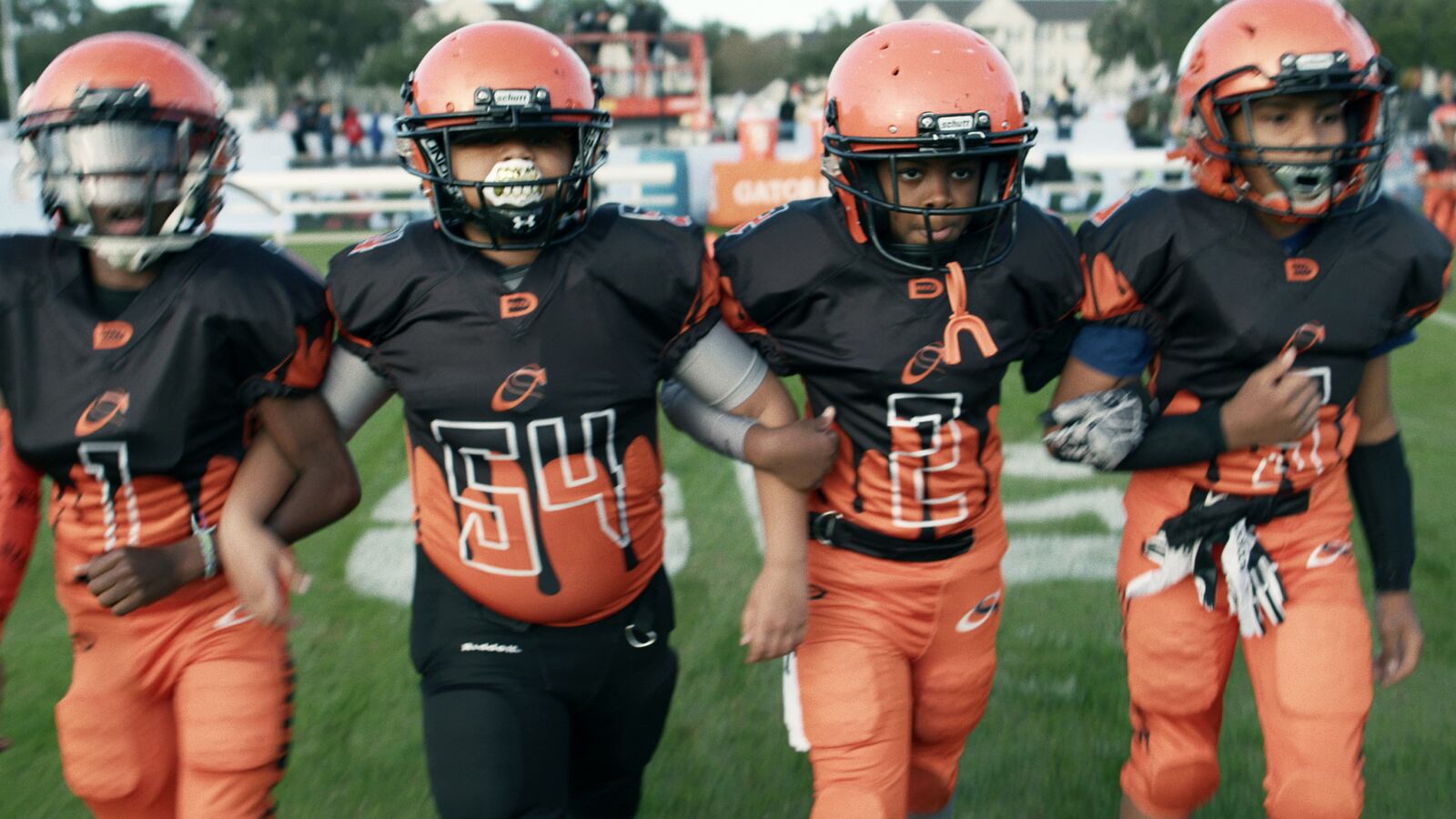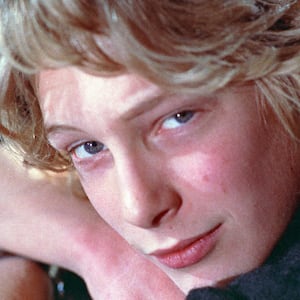In the wake of Cheer’s success, it was inevitable that Netflix would go searching for the next big inspiring sports docuseries. On the surface, We Are: The Brooklyn Saints fits that bill, charting the ups-and-downs of charismatic players and coaches involved with a Brooklyn youth football program. Unfortunately, however, surface is primarily what you get from director Rudy Valdez and executive producers Ron Howard and Brian Grazer’s four-part non-fiction effort, which is full of personality but woefully light on depth.
We Are: The Brooklyn Saints (premiering Jan. 29) takes an intimate look at the Brooklyn Saints, a community-funded pigskin squad for three different age groups—7-9-year-olds (9U), 10-11-year-olds (11U) and 12-13-year-olds (13U)—founded and operated by a group of individuals with their hearts in the right place. They’re led by 9U Coach Edwin Gawuala, a boisterous, energetic, and caring mentor who never stops expressing his genuine love for his charges. Gawuala is the soul of the Brooklyn Saints, and whether at practice, at his kids’ homes, on camping trips, or during games, his enthusiasm is matched only by his compassion for their emotional and psychological well-being. In every respect, he’s what a youth sports coach should be.
Gawuala and fellow coach Vick (whose son D-Lo is the 9U quarterback) view football as a vehicle for imparting important life lessons about hard work, discipline, resilience and teamwork, just as founder Demel (whose son Kenan is the 13U team’s QB) sees it as the surest path available to college. The NFL, most everyone agrees, is a dream that takes a backseat to higher education. As such, the pressure put on these still-developing players has far less to do with aspirations about being drafted by a professional franchise than with using sports to better themselves and their overarching prospects. These parental figures’ noble talk is backed up by their actions, as We Are: The Brooklyn Saints features myriad scenes of Gawuala, Vick, Demel, and other adults extolling their values both to the camera and to their kids, whose ability to find joy on the field—even in the face of sometimes trying adversity—seems to stem from the principles their elders have passed onto them.
Nonetheless, running only three hours long, We Are: The Brooklyn Saints proves that less is sometimes just less. The Saints’ ambition is to make it to the illustrious national championship tournament in Florida. Yet from the outset, director Valdez fails to supply basic information about their quest, such as the number of regular-season games the team will play; what record they need to qualify; how well they’ve fared in past years; and the basic structure of the tournament itself. By denying us these contextual fundamentals, he sabotages the series’ attempts to generate mounting drama from the Saints’ efforts to achieve their goals. Compounding this situation, he merely provides fragmented snapshots of the Saints’ games, thereby neutering most of the excitement and suspense regarding their performance.
Employing vigorous handheld camerawork that places one right in the middle of the mayhem, Valdez does an excellent job conveying the chaotic nature of youth football, where blocking is minimal, throwing is rare, and helter-skelter every-man-for-himself hero ball is the norm. Also extending to beautiful sunrise and dusk sequences of the kids at practice, We Are: The Brooklyn Saints’ aesthetics strikingly evoke the travails of both its young and old subjects. What they can’t do, however, is compensate for storytelling that refuses to get into the nitty-gritty of these individuals’ lives. At almost every available turn, the series offers snippets of substantive details about its main players, only to then pull back from digging deeper into their circumstances.
Consequently, we hear about and see young Aiden commute with his dad Dave to and from their upstate New York house, but never learn why they reside there, what Dave does for a living, or the whereabouts of Aiden and his brother Dave Jr.’s mother. Similar sketchiness undercuts the profiles of D-Lo and his father Vick—the latter of whom winds up being arrested for a charge that’s only retrospectively explained—and Kenan, who finds himself torn between focusing on football and mechanical engineering. Even Gawuala remains an enigma throughout; though we get a palpable idea about his fieriness and commitment via his coaching, we’re told virtually nothing about his private life (save for a late third-episode bombshell about the death of his own infant son, which is randomly revealed and then immediately dropped), the reasons for his unemployment, and specifics about the eventual job he strives to secure.
By leaving so much unspoken, We Are: The Brooklyn Saints stymies any serious engagement with its tale, which is reduced to a collection of heartening soundbites, stylish practice and game sequences, and a lot of filler. From top to bottom, the Saints’ personnel are so charming, and so dedicated to treating sports as an opportunity for personal growth and advancement, that it’s a shame we never feel like we know them in a meaningful way. Their faces become familiar but their actual plights remain a mystery, which proves all the more frustrating as the proceedings segue to the Saints’ trip to Florida for their shot at the title, and Gawuala suggests—after repeatedly stating that his unpaid work as Saints coach is his priority—that he may be retiring from his position at the end of this campaign.
We Are: The Brooklyn Saints’ failure to build to a stirring climax is the result of its preceding disinterest in presenting warts-and-all portraits of its protagonists. So eager is it to maintain an uplifting message—about sports’ capacity for teaching young men the tenets they need to succeed, and about the benefit of putting school first—that it shies away from anything that might unduly complicate it. It’s hard to determine whether the things Valdez’s series doesn’t tell us would change our opinion about the Saints’ program, but it’s easy to understand that—by denying us access to the big picture—it turns itself into a missed opportunity.


